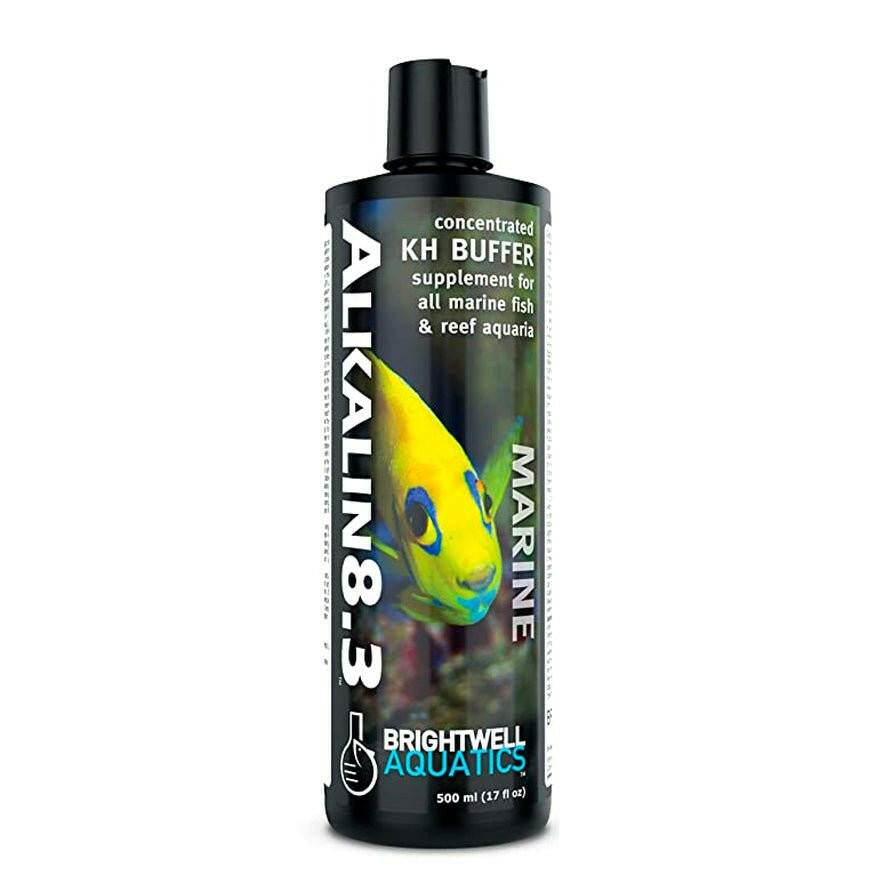- Raises alkalinity, adjusts pH to 8.3
- Unlike single component KH products such as sodium carbonate, Alkalin 8.3 is a multi-component automatic buffer that regulates pH and its use makes for a much more stable aquarium. Eliminates pH and KH instability caused by poor salt mixes and ineffective buffering products. Highly-effective alkalinity(KH)-increasing (”buffer”) solution.
- Helps increase pH Stability in an aquarium by raising the alkalinity.
- Provides a source of carbonates, which make up the majority by weight of aragonite, the mineral secreted by reef-building organisms as skeletal material.
- Continued addition raises pH until 8.3 is reached, at which point the pH remains unchanged and the alkalinity alone increases.
- Over 50% stronger than most competing products.
- Free of phosphates, silicate, and organic material.
- Formulated by a marine scientist
Maintaining the alkalinity in marine aquaria between 7.5 - 9.5 dKH (2.7 - 3.4 meq/L) will generally maintain pH within the desired range. The rate at which alkalinity is depleted in a reef aquarium is determined by the stocking density of reef-building livestock, type of lighting, rate of water circulation, and other biological, physical, and chemical conditions; therefore, each aquarium will have different requirements for the rate of alkalinity supplementation. Once the rate of alkalinity depletion in the aquarium has been determined, the proper dosing rate of this product can be easily calculated. It is recommended that a quality salt mix with the proper (not augmented) alkalinity and concentrations of major, minor, and trace elements be used to establish natural seawater parameters in the reef aquarium, providing a stable ionic foundation on which to build. For additional information on alkalinity and other important aspects of marine chemistry for marine aquaria.
All Brightwell Aquatics liquid water care supplements are made with purified water and high purity materials. We develop formulae for aquaria based on empirical data, using observation and measurement rather than theory.
Advanced: Determine the alkalinity in the aquarium using an accurate test kit before supplementing. Shake product well before using. Each ml of Brightwell Aquatics Alkalin8.3 will increase the alkalinity in 1 US-gallon (3.785 L) of water by 3.1 dKH (1.1 meq/L). If the initial alkalinity in the aquarium is below 7 dKH (2.5 meq/L), add this product at the maximum rate of 5 ml per 10 US-gallons daily until the desired alkalinity is attained, then dose daily or weekly as needed (see below). For minor adjustments to alkalinity, add 5 ml (1 tsp) of Alkalin8.3 per 30 US-gallons of aquarium water as needed to maintain the alkalinity within the proper range. Always try to maintain the alkalinity within a range of +/-1 dKH. To determine the rate of alkalinity depletion once the desired alkalinity has been acquired, measure the alkalinity at the same time each day over a one- to two-week period. To determine the daily dosing rate (preferable to weekly dosing) for alkalinity maintenance: estimate the volume of water in the entire aquarium system; divide the daily decrease in alkalinity by 3.1 (when measuring alkalinity by dKH; divide by 1.1 when measuring by meq/L); multiply this number by the volume of water in the system to get the daily dosage required (ml) to maintain a stable alkalinity. Daily dosing maintains a more stable alkalinity and pH (and a more natural environment) than dosing weekly, in which the alkalinity spikes just after dosing and then gradually decreases throughout the course of the week.
Problem pH Aquariums: Aquaria with low circulation at the water’s surface, or in which a CO2-injected calcium reactor is being employed, or which are placed in an enclosed room with human and animal inhabitants (giving off CO2 into the air), often have a depressed pH due to carbon dioxide build up. Boost pH+ can help overcome this along with other measures, such as providing outside air to the skimmer intake port or other methods to control CO2 and bring pH in the aquarium back into a higher desired range without raising alkalinity to an unacceptable level. Use Boost pH+ as directed and do not exceed a pH value of 8.5, because pH at 8.6 or higher may be stressful and/or damaging to sensitive aquairum inhabitants. Additionally, changes to pH should be made very gradually, again to avoid stressing aquarium inhabitants. See suggestions for adjusting alkalinity below. It is not unusual for pH to fluctuate throughout the course of 24-hours between seemingly wide-ranging values (i.e. lower at night higher during the middle of the day); this is a natural occurrence that is caused by changes in the rates of photosynthesis between dark and light periods. If pH levels are seen to be constantly below the desired level and alkalinity is within the proper range, then the addition of Boost pH+, this product, may be very helpful.
Caution: Contains carbonate and bicarbonate salts; harmful if swallowed. If swallowed: give water, get medical attention. May cause eye or skin irritation. If in eyes, flush with water for 15 minutes, get medical attention. If on skin, wash thoroughly with water. Keep out of reach of children. Not for human consumption.
Ingredients
Purified water, inorganic Bicarbonate, Carbonate, Sulfate, Borate salts, proprietary ingredients


